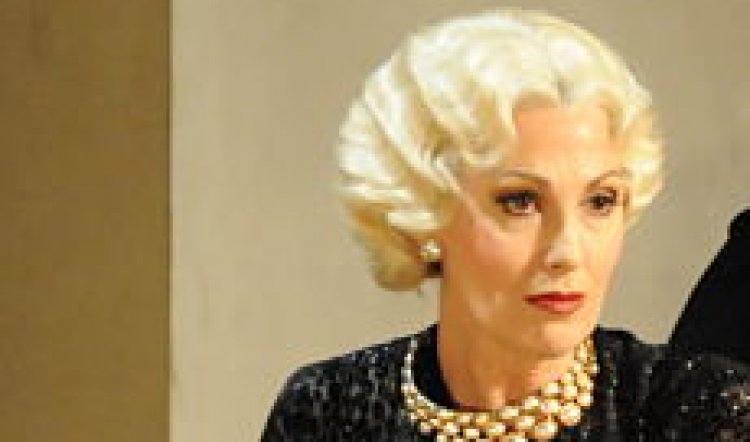
Opera Schmopera
There’s nothing like an opera uproar when it comes to high drama, betrayal, revenge and poison. And Opera Australia’s latest is easily the most dramatic event the company has produced in a some years. This one is about the state and direction of the company under the artistic guidance of its post-Simone Young music director, Richard Hickox.
There have been rumblings for some time, from both sides of the footlights. For a while it was like a virtual version of the Princess and the Pea: there was discomfort but nobody could quite put a finger on why and what. Several dozen mattresses (iffy seasons, draining goodwill, undefined discontent,) had to be dug under and removed before the the nature of the pea finally began to emerge.
Depending who you talked to it goes like this: the company has retreated from the musical thrills, rigour and excitement of Young’s dazzling reign; the company has become dull, provincial, second-rate; singers are being cast who are dubious choices – looks more important than voices, pay packets more important than talent. And then there’s the truly vexed business of the boss casting his wife. More of that in a minute.
Fiscal responsibility was supposed to be what all the above is about – in contrast to Simone Young’s extravagant reign, that is. (Not sure that nepotism is the same as economic rationalism but never mind.) And whichever way you look at it, the towering figure of the diminutive but departed Young continues to hang over the company. And as she soars from success to success in Europe, that will continue for some long while, especially as she jets back in to appear with the Sydney Symphony every year and rub salt in the thinly healed wounds of her fans.
The trouble is, Opera Australia under Simone Young was exciting, glamorous, unpredictable and – often – brilliant. Okay, so she’s a minx, headstrong and not prepared to do some of the dross-type chores that fall to the modern multi-skilled arts worker, but that’s why you have people who are good at that kind of thing. They’re called managers. The best managers can not only do the admin and sort the strategies to achieve the financial goals, but – crucially – they can manage the artistic goals too. And that means managing the artistic visionary.
As it is, the present is another country and while Simone Young goes from strength to strength in Hamburg, Opera Australia flounders in a miasma of blah. It’s not to say there isn’t good stuff happening (Billy Budd was a brilliant recasting this year) but the excitement and the thrill are missing, no matter how hard they try to spice up their brochures and seasons with the words – you can splash “passion” across a poster 20 times but it don’t mean a thing if it ain’t got that zing.
Essentially, with a few notable exceptions, the programming is for the old dears who don’t want to be jolted out of their twilight reverie, tourists who’ll go to the opera house for a flea circus, plus some kind of cock-eyed notion of popular, economical programming.
Where are the experiments and bold programming that have to be in the mix with the tried and true and the chocolate box shows? For a clue you need only look to last week when Opera Australia and the ABC jetted us gently back to 1982. (That was when the first simulcast from the Opera House took place. It was Die Fledermaus and it netted the ABC an audience, nationwide of two million.)
More simulcasts followed that one and became a popular staple in the opera diet of a country whose national company really can’t tour. But in recent years both organisations have been crying poor (and undoubtedly are although both seem to find the cash for some truly inane adventures). Last week, however, they recapped 1982 and managed a live broadcast of La Boheme. It’s Simon Phillips’ production with a lively young cast and is a classic crowd-pleaser, like Fledermaus. What a pity we weren’t able to see, on TV, his truly thrilling production of Berg’s Lulu. In 2003 it set the Sydney Opera House aquiver with originality, sensuality and sheer black magic. It featured Emma Matthews – in the role that launched her as a truly serious singer – conductor Young in a backless scarlet gown that made her part of a production which was itself brilliantly designed by Stephen Curtis. Lulu wasn’t cute, it wasn’t chocolate box, but it was great art and we’ll never see it like that again.
.All the best dramas have comedic moments though and one was provided one recent Saturday morning (October 18) with soprano Cheryl Barker’s defence of her alma mater and its management in the letters page of the Sydney Morning Herald which read as follows:
“I am writing to show my support for Opera Australia, its chief executive, Adrian Collette, and its musical director, Richard Hickox. I cannot believe this debacle is still going on. It is damaging the reputation of Australian opera internationally, something Hickox has been championing when abroad, as have other Australian international performers. By securing the release of live recordings by Chandos Records, Opera Australia performances are being heard internationally.

“These recordings would not have come about had it not been for Hickox. It is about time the media jumped off the bandwagon of a few bitter and disgruntled people and appreciated the good things.”
As Mandy Rice Davies once so famously said when Lord Astor denied having an affair or having even met her: "Well, he would, wouldn't he?"
Cheryl Barker is a pal of the musical director and has been doing very nicely under him at OA thank you. (As she is entitled but there are others of a similar calibre and stature who are not pals and have not.) And it is disingenuous to bring up the vexed matter of the Chandos discs when they have been the subject of much unresolved heart ache for the singer who suffered most by the sound engineering and mixing of the recordings: Bruce Martin. It’s a matter that has been aired fully in The Monthly in an extensive article by Gideon Haigh and is essential reading.
Barker would no doubt call it “media on the bandwagon” rather than an exhaustive and damning critique, but then – in Martin’s expert opinion – she and the musical director’s work were the among the beneficiaries of the recording manipulation (on Rusalka).
The thing is, with the exception of Chambermade in Melbourne and their championing of new work; and Pinchgut, whose exploration of rare baroque and early work is Sydney’s only taste of freshness, opera in Australia – through its flagship cash-gobbling company – is going nowhere artistically. OA needs a new, energetic, accountable, transparent and strong management and musical management that inspires and excites and is here for the company and for Australian singers – as the Bunterish Hickox really does and is not.
In her letter Cheryl Barker told us to jolly well buck up and stop being mean to Richard Hickox because “It is damaging the reputation of Australian opera internationally, something Hickox has been championing when abroad …” And that’s some kind of truth as, according to his wife, he has to be abroad quite a lot (six months of the year apparently) for tax reasons. Not impressive, and an insult to the company, its audience and staff.
Then there’s the matter of his wife, mezzo soprano Pamela Helen Stephen. If she was part of the Hickox package, it was not made known to the public when he got the job in 2005. It has been said that giving her some roles is small compensation for being rudely ripped from her unspectacular career in Europe. But that was their choice, surely, and one of the difficulties of the modern marriage. A parallel has been drawn by someone to the Bonynge-Sutherland situation: buy one, get one free (well, not free, but they came as a package). It’s only mentioned because the comparison is so ridiculous if not downright insulting to both Bonynge and Sutherland.
Nevertheless, Australia certainly has a weirdly unattractive attitude towards nepotism (and its doppelganger, plagiarism) both unpleasant traits that are for some reason seen as trivial. Maybe it’s the convict thing, or maybe it’s simply a sign of the times when principles, morals and standards are seen as rather silly and old fashioned. Whatever it is, the brouhaha began with mezzo soprano Fiona Janes’ rashly brave (despairing?) stand against what she described as the “abyss of mediocrity” into which she sees the company falling.
There are many who agree with her reading of the situation (and of course, many who don’t) but you’d have to be nasally challenged not to detect the whiff of ennui, mildew and ashes of roses talc rising from the board room and management of this rather sad rump of a company. If it were a footy teamheads would be rolling and questions being asked. As it is, the most pervasive pong is irrelevance.



